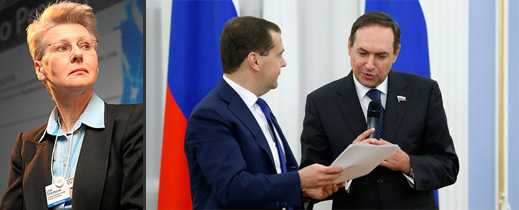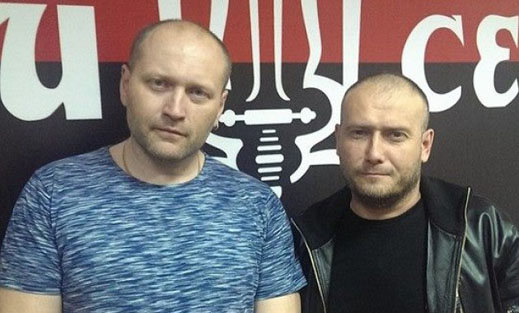
By John Helmer, Moscow
Petro Poroshenko disappointed most of the audience at Victor Pinchuk’s Kiev party on Friday and Saturday by suggesting that he is ready to trim the terms of Ukraine’s partnership agreement with the European Union in order to meet President Vladimir Putin’s demands. But that’s exactly what Pinchuk (front row, 6th left) needs if Interpipe, his steel and pipemaking group in Dniepropetrovsk region, is to trade its way out of bank default and insolvency.
According to Poroshenko, “We have to be the most flexible concerning the [EU] Agreement on association and do everything possible to keep those opportunities which we will have within association, and at the same time to make it comfortable for Russia. I will personally use my best efforts for this purpose.”
“European Commission clerks in the audience were shocked”, according to Ukrainian news reports, that Poroshenko appeared to be postponing the trade sections of the EU agreement until 2016 at the earliest; the timing to depend on how negotiations between Kiev and Moscow go between now and then. For background on what was decided in Brussels at a meeting on September 12 between Russian and Ukrainian officials with EU trade commissioner, Karel De Gucht, read this.
Poroshenko followed with a declaration on Crimea that was also insufficiently warlike for the clerks. According to the Pinchuk website, Poroshenko said: “They say that we have lost Crimea, no. We have an invasion in Crimea, but Crimea will be back with us again. It is not necessary even to use military means, I am sure that we will win the economic, democratic, liberal competition for the sentiments of the Crimean people. And the standards of living in Ukraine beyond the administrative border with the Crimean peninsula will be much better, and this is the only way to win the battle for the sentiments of the inhabitants of Crimea. And it is exactly the same way to solve the crisis in the Eastern Ukraine”.
The Russians who accepted Pinchuk’s invitation and joined the Kiev party are critics of Putin and supporters –- some of them advisors — of Prime Minister Dmitry Medvedev. According to the list of more than 500 participants issued by Yalta European Strategy (YES), these anti-Putin Russians were publicists Yevgenia Albats, Yevgeny Kiselov, and Saken Aymurzaev of Echo Moscow Radio; Igor Yurgens, an advisor in Medvedev’s ill-fated presidential campaign in 2011-2012; Lilia Shevtsova (below, left), who divides her employment between an American and a British think-tank; Vyacheslav Nikonov (right), currently a State Duma deputy and chairman of the Russkiy Mir foundation.

A Kiev press report claims that during Pinchuk’s conference Yurgens publicly reproved the outgoing European Commission president José Manuel Barroso: “What you agreed today it is exactly what Russia asked you to accept prior to the crisis. And if you had agreed then, there wouldn’t be a crisis.” Earlier Yurgens had signed a declaration launched by Richard Branson, the British owner of the Virgin Group, who has announced: “despite Putin’s seeming popularity in Russia, we want Putin to know the vast majority of businesspeople in Russia” are against the conflict.
Mikhail Fridman’s Alfa Bank is listed as one of Pinchuk’s “special partners” for the Kiev event. How much money this cost the bank the YES secretariat won’t say. The payment allowed the bank to post this advertisement on Pinchuk’s website: “As a member of Alfa Group, Alfa-Bank (Ukraine) embodies the group’s abundant financial expertise, driving the synergy of inside-out knowledge of both Ukrainian bank market and internationally accepted business practices. The bank enjoys continued shareholder support via regular equity injections which provide for its continued development.”
This appears to mean that Fridman (lead image, top left), a west Ukrainian by birth, is the only Russian currently to be financing the country with fresh Russian cash. In a rating notice last month for Alfa Bank Ukraine, Standard & Poors reported the outflow of cash which is damaging the liquidity of the Ukrainian banking system, but noted “the ongoing and extraordinary support [Alfa Bank Ukraine] continue[s] to receive from high-rated parents.” Fridman transferred $300 million to his Ukrainian subsidiary in the first quarter of this year.
Top fifteen banks in Ukraine at the start of 2014

Source: National Bank of Ukraine.
Alfa Bank Ukraine isn’t as vulnerable to the growth of non-performing loans and collapse of the Ukrainian economy as the Russian state banks – VEB, Gazprombank, VTB, and Sberbank. In February, the Fitch ratings agency explained that Alfa Bank Ukraine’s “loans to Ukrainian corporates amounted to only USD120m at 20 February 2014. Alfa Bank (Ukraine), a sister bank with USD3bn of assets (excluding foreign interbank and related party loans) is primarily locally funded, so poses limited contingent risks.” Criminal investigations launched by the government in Kiev for allegedly financing eastern region “separatism” or “terrorism” have struck at the Russian state banks, but they have glanced off Alfa Bank.
A study of the position of the Ukrainian banks, issued by a Kiev brokerage in August and entitled “Leaking Out”, highlighted Alfa for defying the sector trends, improving its liquidity, holding the confidence of its corporate depositors, and planning to buy up other Ukrainian banks as they fail. The charts illustrate liquidity and loan loss reserves for Alfa Bank Ukraine through March 31.

Click to enlarge
Source: Investment Capital Ukraine
Fridman’s Ukrainian bank chief executive was previously employed by Pinchuk at Interpipe. The bank is known to be lending money to Pinchuk’s businesses, and to have avoided joining Interpipe bondholders and international bank lenders in declaring Interpipe in default on debts totalling more than $1 billion. Interpipe’s debt to Alfa Bank is estimated at $20 million. More costly risks of expropriation and loss for Fridman threaten his mobile telephone assets in Ukraine, most of them owned by Vimpelcom.
A source in Kiev claims: “Pinchuk and Fridman were good friends, and Pinchuk helped Fridman in 2011 when the latter was fighting with Telenor for control in Vimpelcom.”
Alongside Fridman, the other “special partners” Pinchuk recruited to help with the bills of the YES conference are Rinat Akhmetov’s DTEK energy utility; and Igor Kolomoisky’s Burisma Holdings, a gasfield explorer. One of Burisma’s two US directors, Devon Archer, was a listed participant in the YES conference, along with Burisma’s “principal”, Nikolai Zlochevsky. Archer and another Burisma director, Hunter Biden, are connected by family ties to Secretary of State John Kerry and Vice President Joe Biden.
Burisma’s advertisement at the conference makes these claims: “The leading independent exploration & production company operating in the Ukrainian oil & gas market since 2002. Today, Burisma Holdings is developing licensed areas represented by key hydrocarbon basins of the country, including the Dnieper-Donets and Carpathian. The Company has extensive experience in the Ukrainian gas market, and implements best-in-class technology as well as high standards of Corporate Governance. Its unrivaled track record in the oil & gas industry contributes to Ukraine’s strategy for building energy security and maintaining stability in the region.”
Noone answers at Burisma’s registered office at St. James Square in London. Instead, the chief executive and his deputy pick up the telephone at Asterius Fund, a small hedge fund registered in the Cayman Islands since 2011.Burisma doesn’t release reports of its financial condition, nor will it say whether it is applying for the US government’s loan guarantee programme for Ukraine.
Beside Burisma, Pinchuk invited Kolomoisky’s military unit, the Dniepr Battalion, to send its commander, Volodomyr Parasyuk (lead image, right foreground). The military and political formation called Pravy Sektor, headed by Dmitry Yarosh (below left), was also invited by Pinchuk to participate. Its representative was Yarosh’s spokesman, Boryslav Bereza (right).

Listed at the cheaper paying category as Pinchuk’s “partner”, there are George Soros’s Ukrainian operation, International Renaissance Foundation; the Ukrainian brokerage Concorde Capital, and the Anglo-Dutch oil company Shell.
The remaining Ukrainian oligarchs who were ordinary participants at the conference, not partners, were the Guta family of the Mriya agro-industrial group; and Sergei Taruta, whose interests include the steelmaking Industrial Union of Donbass; Vizavi Bank; and Kiev’s appointee since March as the nominal governor of Donbass.
In the past, regular attenders at Pinchuk’s conference were Tony Blair, the former British prime minister, and either former US president Bill Clinton or his wife, former Secretary of State, Hillary Clinton. Blair failed to appear for the YES group photograph (below), but he spoke briefly at the Friday luncheon.

Source: http://www.eurointegration.com.ua/
The Clinton family was missing this year. Instead, there was former General Wesley Clark (below), a campaign booster for Mrs Clinton; Lawrence Summers, treasury secretary in the Clinton Administration; and Douglas Schoen, a lobbyist Pinchuk retains in New York and Washington as his channel to Mrs Clinton’s presidential campaign.












Leave a Reply